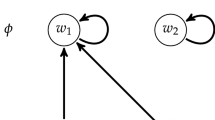Abstract
This paper uses the framework of Popper and Miller's work on axiom systems for conditional probabilities to explore Adams' thesis concerning the probabilities of conditionals. It is shown that even very weak axiom systems have only a very restricted set of models satisfying a natural generalisation of Adams' thesis, thereby casting severe doubt on the possibility of developing a non-Boolean semantics for conditionals consistent with it.
Similar content being viewed by others
REFERENCES
Adams, E. W. (1975). “The Logic of Conditionals”, Reidel, Dordrecht and Boston.
Birkhoff, G. (1973). “Lattice Theory”, 3rd ed., American Mathematical Society, Providence.
Calabrese, P. G. (1994). “A Theory of Conditional Information with Applications. ” IEEE Transactions on Systems, Man and Cybernetics 24(12): 1676–1684.
Curry, H. B. (1977). “Foundations of Mathematical Logic”, Dover, New York.
Donellan, T. (1968). “Lattice Theory”, Pergamon, Oxford.
Döring, F. E. (1994). “Probabilities of Conditionals”, in The Philosophical Review 103: 689–700.
Eels, E. and Skyrms, B. (eds.) (1995). Probabilities and Conditionals, Cambridge University Press, Cambridge.
Goodman, I. R., Nguyen, H. T. and Walker, E. (1991). Conditional Inference and Logic for Intelligent Systems: A Theory of Measure-Free Conditioning, North-Holland, Amsterdam.
Hajek, A. (1989). “Probabilities of Conditionals – Revisited. ” Journal of Philosophical Logic 18: 423–428.
Jackson, F. (ed.) (1991). Conditionals. Oxford Readings in Philosophy, Oxford University Press, Oxford.
Jeffrey, R. C. and Stalnaker, R. (1995). “Conditionals as Random Variables, ” in Probabilities and Conditionals, E. Eels and B. Skyrms (eds.).
Leblanc, H. (1983). “Alternatives to Standard First-Order Semantics” in D. Gabbay and F. Gruender (eds.), Handbook of Philosophical Logic, Vol. 1, Reidel, Dordrecht, pp. 189–274.
Leblanc, H. and Roeper, P. (1990). “Conditionals and Conditional Probabilities: Three Triviality Theorems”, in H. E. Kyburg et al. (eds.), Knowledge Representation and Defeasible Reasoning, Kluwer, pp. 287–306.
Lewis, D. K. (1976). “Probabilities of Conditionals and Conditional Probabilities, ” in The Philosophical Review 85: 297–315.
McDermott, M. (1996). “On the Truth Conditions of Certain 'If'-sentences. ” Philosophical Review 105: 1–37.
Milne, P. (1997). “Bruno de Finetti and the Logic of Conditional Events. ” British Journal for the Philosophy of Science, Vol. 48, 2:195–232.
Popper, K. and Miller, D. (1994). “Contributions to the Formal Theory of Probability”, in Humphreys, P. (ed.), “Patrick Suppes: Scientific Philosopher”, Vol. 1, pp. 3–23, Kluwer.
Schay, G. (1968). “An Algebra of Conditional Events. ” Journal of Mathematical Analysis and Applications 24: 334–344.
Author information
Authors and Affiliations
Rights and permissions
About this article
Cite this article
Bradley, R. More Triviality. Journal of Philosophical Logic 28, 129–139 (1999). https://doi.org/10.1023/A:1004391701130
Issue Date:
DOI: https://doi.org/10.1023/A:1004391701130




